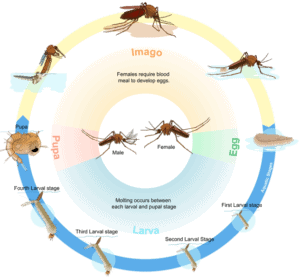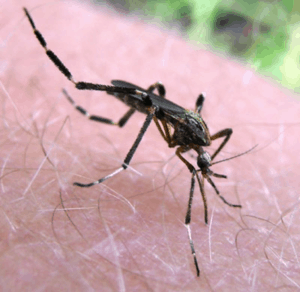In the first article of our three-part series on the aftermath of Hurricane Florence, we explored the potential effects that hog waste overflow could have on public health and water contamination. In the second part of our series, we are diving into a new flood-related public health threat – mosquitoes. In North Carolina alone, Florence dumped upwards of 30 inches of rain and caused at least $13 billion in damage. The high amounts of rainfall and standing rain, plus North Carolina humidity has created the perfect breeding ground for mosquitoes. Mosquitoes eggs need some form of water to hatch. While some species of mosquitoes lay eggs directly in water, other species lay eggs on the soil by floodwaters. Once the floodwaters begin to rise and the eggs come into contact with water, the eggs usually hatch within 24 to 72 hours.
According to Michael Reiskind, Assistant Professor of Entomology at North Carolina State University, North Carolina residents can expect the mosquitoes following Florence to be up to three times the size of normal mosquitoes. Reiskind claims that in the days following Florence, researchers have seen a lot of “gallinippers” or Psorophora ciliata. Though this type of mosquito is usually rare, the female gallinipper produces a lot of eggs which she spreads out around flood-prone areas like wet meadows and agricultural land. As floods occur, her eggs begin to hatch as they come in contact with water. As larvae, gallinippers tend to prey on other mosquito larvae. This leads them to be extremely large as adults. Despite their large size, the good news is that as adults, gallinippers usually do not live more than a couple of weeks.

Risk of Disease
The mosquito-borne illnesses most often found in North Carolina are West Nile virus, Eastern Equine Encephalitis, and La Crosse encephalitis. Though these more common mosquito-borne illnesses usually do not cause symptoms, some people are at risk for flu-like symptoms such as headache, fever, chills, and vomiting. So far, no cases of dengue fever or malaria have been determined to have been acquired in North Carolina following Hurricane Florence.
Despite the increase in the mosquito population, according to the North Carolina Department of Health and Human Services, most of the mosquitoes that residents will see following the storm are likely “nuisance” mosquitoes. However, they can carry dog heartworm so it is important that your family dog is up to date on heartworm prevention medication. These mosquitoes, including the Psorophora ciliatausually do not spread viruses or make people sick, but produce pesky bites and can be very painful, especially for individuals who are more susceptible to mosquito bites in general. According to the CDC, the increase in the mosquito population and risk of disease is likely to continue for upwards of two months following the storm.

Prevention
Mosquito-borne illnesses and bites can be prevented in two ways: personal protection and reducing the mosquito population. To fight the mosquito population, North Carolina Governor Roy Cooper ordered $4 million to be spent on mosquito control following Hurricane Florence. The funds will be divided up amongst the hardest hit counties that are still at risk for standing flood water. According to the CDC, residents in these areas should also utilize DEET (or an equivalent) and wear long-sleeves and long pants while outdoors.
